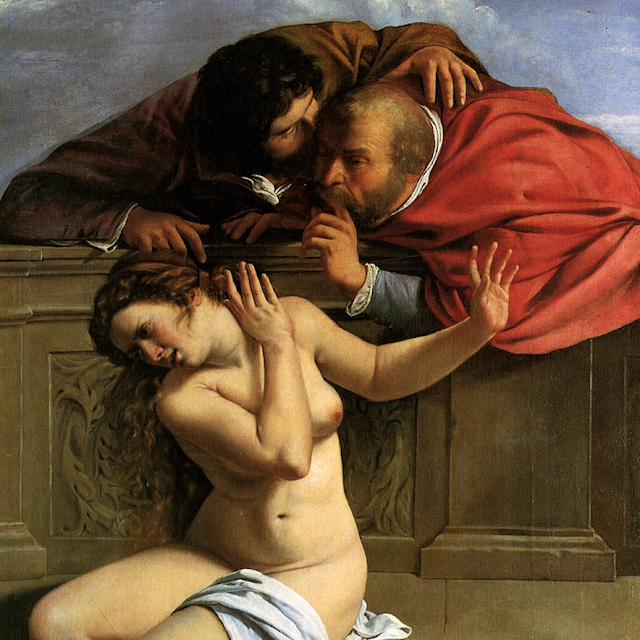Suzannah & the Elders: Ophelia, Eliz I, & the Nunnery Scene

Painting, 1610 Artemisia Gentileschi
What if we're missing something important in our understanding of the nunnery/eavesdropping scene (3.1), with Ophelia and Hamlet spied on by Polonius and Claudius?
—What if it has more to do with Elizabethan politics and propaganda than with Freud?
—What if Elizabethans may have understood the scene very differently because of current events of the Elizabethan age, but which has been lost over time?
—What if the missing clue is that the scene offers a radical variation on the tale in Daniel 13, about the virtuous Suzannah, whom two judges tried to coerce into having sex with them?
Frank Ardolino (author of Apocalypse & Armada) says the eavesdropping scene in Kyd's Spanish Tragedy echoes the biblical tale of Suzannah & corrupt judges (Daniel 13), a tale often used to defend Elizabeth I from her critics: Her defenders compared the Virgin Queen Elizabeth to the virtuous Suzannah, and compared her critics to the corrupt judges.
This eavesdropping scene in Hamlet may offer a dramatic twist on the Suzannah tale, made to reflect more accurately on how some people of the time perceived Eliz. I (as a critique of Elizabeth) rather than as her defenders used the biblical tale.
The Suzannah tale is about a virtuous married woman who risks her life to stand by the truth, although two corrupt judges tried to coerce her into sex by threatening to accuse her of meeting a lover in her garden. She prevailed in the end with Daniel’s help.
So for example, if Elizabeth’s critics had legitimate criticism of the Virgin Queen, her critics would claim in defense, no, she’s virtuous and you critics are like the corrupt judges in the Suzannah tale. This is how propaganda works: Don’t engage the criticism with facts, but instead, simply reply with a biblical analogy that projects the image you wish to project.
The Hamlet scene revises the Suzannah tale: Instead of Suzannah/Ophelia being preyed upon by corrupt judges who want sex, the corrupt elders are Claudius and Polonius; instead of spying on her and then demanding sex, they want to use her to spy on Hamlet.
And remember, Ophelia told her father that Hamlet approached her in honorable fashion and made to her “almost all the holy vows of heaven.” Here Hamlet is not an illicit lover meeting her for sex, as claimed in the lie by the corrupt judges, but a prince to whom she might have been betrothed if her brother and father had not been so fearful of him using her.
This is no longer a virtuous Suzannah who is steadfast in her commitment to the truth and to her own innocence, but a young woman who has agreed to spy on the prince, her nearly-betrothed.
So this is quite a twist to the Suzannah tale: If it's a commentary on Elizabeth, it claims that Elizabeth, like Ophelia, has been made a willing tool of the more powerful men around her, an opinion held by Lord Essex, once one of Elizabeth's favorites. That opinion motivated him to attempt a rebellion, which failed and cost him his head.
#Ophelia #Shakespeare #Hamlet #EarlyModern #Bible #Renaissance #Theater #Drama #Literature #EnglishLiterature
very interesting critique of what took place. I can see spies telling stories to get what they wanted back then. Thanks for sharing this sordid tale rendition.
ReplyDeleteThanks, James, and sorry for the very belated reply; still getting used to the blog and how it works (and how it alerts me to comments!).
DeleteI have to give Frank Ardolino most of the credit for noticing a Suzannah & the Elders echo in "The Spanish Tragedy" and its eavesdropping scene. If I had not come across his book, I would not have thought to apply the same insight to the eavesdropping/nunnery scene in Hamlet.
Thanks again, and let's keep an eye out for those spies! ;-D